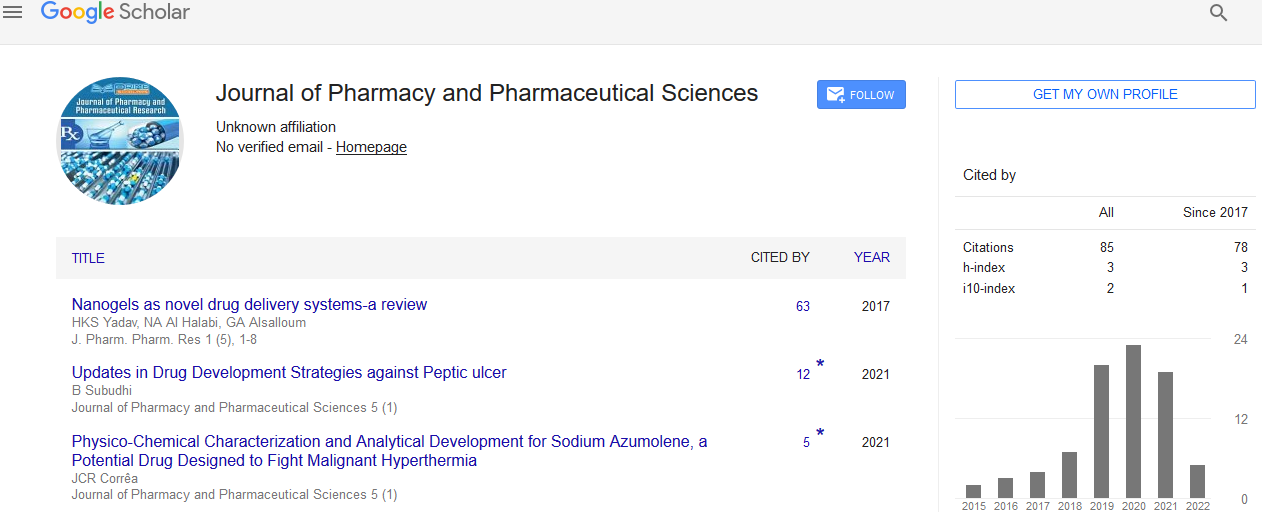Opinion - (2022) Volume 6, Issue 3
The Role of Pharmaceutical Therapy
Alian Sabbir*
Department of Pharmaceutical, University of Bamenda, Cameroon
*Correspondence:
Alian Sabbir, Department of Pharmaceutical, University of Bamenda,
Cameroon,
Email:
Received: 01-Jun-2022, Manuscript No. IPIPR-22-13913;
Editor assigned: 03-Jun-2022, Pre QC No. IPIPR-22-13913(QC);
Reviewed: 17-Jun-2022, QC No. IPIPR-22-13913;
Revised: 22-Jun-2022, Manuscript No. IPIPR-22-13913(R);
Published:
30-Jun-2022, DOI: 10.21767/ipipr.6.3.13
Introduction
Medicines are used to treat or prevent diseases, this is called drug
treatment. Drug treatment, usually also referred to as pharmacotherapy
or pharmacological treatment, refers to the treatment of
a disease through the use of drugs (drugs). It is usually used to
treat or prevent an illness from getting better, as well as to relieve
the worsening and side effects of the condition in question. This
type of treatment requires extensive information and preparation
by drug specialists and other experienced clinical experts in order
to be properly controlled. Drug treatment is currently used to
treat a wide range of conditions and their side effects. Conditions
typically treated with approved prescriptions include: cold and flu
infections, allergies, cancer, HIV infection, diabetes, psychiatric
conditions, bronchitis and other lung problems, autoimmune conditions,
gastrointestinal conditions, high blood pressure and heart
disease, psoriasis, and other skin diseases.
Description
Drug treatment may also be used to treat distress or prevent transmission of a patient’s condition to other people. In addition,
it is usually used in mixed treatment, which includes the use of
drugs, as well as prudent or other clinical drugs. Pharmacology
is an ever-evolving discipline, leading to normal advances in the
persuasive treatment of numerous physical and dysfunctional behaviors.
Because drug treatment encompasses such an extensive
spectrum of drugs used to treat and prevent a wide variety of conditions,
viability can range from restoring the disease referred to,
or substantially reducing distress and side effects, to practical zero
impact in any case is enough. Assuming your GP suggests drug
treatment; he can review with you the feasibility of the particular
medication(s) and suggest likely consolidated treatments. Tampa
General Hospital medical experts are well prepared to treat many
cases with drug treatment and can attempt to create a custom plan
for a custom premise. Symptoms of drug treatment depend on
the particular drug that is recommended, however, some normal
cases of mild adverse effects can include: headache, drowsiness
and fatigue, nausea and retching, rash or skin reactions, irregular heartbeat, diarrhea, weight loss or gain. While not all medications
cause observable side effects, it’s important to discuss possible involvements
and the possibility of other serious side effects with
your GP before beginning drug treatment. The essential goal of
medically assisted treatment is for the patient to achieve fully
assisted relief. Pharmacotherapy is treatment using drugs[1] as
recognized from treatment using a medical procedure (cautious
treatment), radiation (radiation treatment), development (exercise-
based recovery), or other modes. Among physicians, the
term clinical treatment sometimes refers explicitly to drug therapy
rather than careful or other treatment; For example, in oncology,
clinical oncology is distinguished from careful oncology in this way.
Conclusion
Drug specialists are specialists in drug therapy and have the task
of ensuring the protected, proper and gentle use of drugs. The
expected skills to work as a drug specialist require information,
preparation and experience in biomedical, drug and clinical sciences.
Pharmacology is the science that seeks to constantly improve
pharmacotherapy. The drug business and scientific community
use basic science, applied science, and translational science to
create new medicines. As pharmacotherapeutic subject matter experts
and drug specialists, they have a responsibility for direct silent
consideration, often work as individuals in a multidisciplinary
group, and are the essential source of drug-related data for other
medical providers. A pharmacotherapy expert is a person who is
skilled in the direction and recommendation of drugs and requires
comprehensive scientific information on pharmacotherapy.
Acknowledgement
The author is grateful to the journal editor and the anonymous
reviewers for their helpful comments and suggestions.
Conflict of Interest
The author declared no potential conflicts of interest for the research,
authorship, and/or publication of this article.
Citation: Alian S (2022) The Role of Pharmaceutical Therapy. J Pharm Pharm Res Vol.6 No.3:13
Copyright: © Alian S. This is an open-access article distributed under the terms of the Creative Commons Attribution License,
which permits unrestricted use, distribution, and reproduction in any medium, provided the original author and source are
credited.

